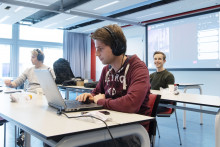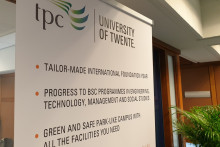Last year, all the study programmes asked their students if they stayed in Enschede or went back home, says study advisor Annet de Kiewit. ‘It gave us quite a good impression of the scope of the exodus. In the case of my programme, Mechanical Engineering, about half of the bachelor’s students returned home last year – with relatively more bachelor’s than master’s students being called back by their parents.’
Over the summer, when it became clear the UT would be able to offer hybrid education, the vast majority of students returned to Enschede, says De Kiewit.
‘Safer with family’
While the UT does not keep track of the numbers on a central level, there are still students who chose to stay in their home countries. Like Konstantina Xanthopolou-Koukogia, a master’s student of Applied Mathematics, who returned to Greece in March last year. ‘I felt safer being with my family, even though the situation in Greece was quite uncertain at that time. Also, I did not know if I would have the ability to travel back to my home country later, especially because some countries were already following the closed borders policy.’
Iulia Popp, a bachelor’s student of Management, Society and Technology, had similar motives to return to Romania in March 2020. ‘Being home with my family feels safe. I have no regrets about going back.’ For Gursehaj Singh, a master’s student of Interaction Technology, things went a bit differently. ‘I went home in the winter break and planned to come back in March. But the situation in the Netherlands got worse and there were no more flights back to Europe. When the flights started resuming, I still decided to stay back because the virus was spreading widely, and I could not access the labs at the UT.’



Gursehaj Singh, Konstantina Xanthopolou-Koukogia and Iulia Popp.
Obstacles
All three students faced their own specific obstacles. Xanthopolou did not want to risk traveling, so she decided to miss the exams that required physical availability. ‘This would not have been an issue, had the UT organized all its exams online,’ she says. In the study programme of Popp however, all exams took place online. ‘The only real challenge was when I decided to do my minor at the ITC faculty. The online education was not as smooth as what I was used to in my actual program. But eventually, they also adapted, and I never had to be physically present, even during exams.’
Singh, as a non-EEA student, faced issues with his residence permit. ‘At the time, I just had to take one course and then could proceed with my thesis. I dropped the course because physical availability was required. All this meant I needed to extend my study period at the UT, and therefore requested the UT to extend my residence permit. The permit was extended, but I was requested to physically collect the permit. This was not possible, and my residence permit expired eventually. I hoped for more assistance from the UT regarding this.’
Jumping through hoops
The UT Visa Office did jump through a lot of hoops however, De Kiewit knows. ‘The Visa Office together with the international student support staff in the faculties took action to ask students where they were and to inform them properly about their situation. For instance, if students chose to de-register from the municipality, the IND would be informed and withdraw their residence permit. In those cases we could raise the alarm and still secure someone’s place to stay, since you’re not done studying here yet. Around Christmas an action was started to identify students who were away for almost a year. It is important that student do take initiative to stay in touch themselves as we do not track their travel behaviour.’
In a lot of cases, the support network from the UT has been going to great lengths to help students out, says De Kiewit. But it depends per specific case to what extent that’s possible, she argues. ‘The fact that a lot is possible online doesn’t mean students automatically have the right to not show up, for a physical exam for instance. An exam committee cannot make a legal exception for a student who prefers to stay abroad because they feel more at ease over there. And because each study programme has its own characteristics, every programme and exam committee has to have their own room to manoeuvre.’
Grey area
Generally speaking, it comes down to determining cases in a very grey area, says De Kiewit. ‘I have a student abroad who has a chronic lung disease and is not allowed to fly. It would be irresponsible to, so we can make a legal exception for such a case. Also for a death in the family in combination with flight restrictions for instance. But there are also students who travel abroad to visit a dentist or go for a family visit… In those cases our hands are tied.’
Meanwhile, the three students who are abroad may or may not return. ‘I will have to graduate from home unfortunately and will need another visa just to collect my degree,’ says Singh. Xanthopolou hopes to take the in-person re-sit opportunities for the exams she missed, in the next academic year. Popp plans to graduate from home. ‘And I don’t plan on returning to the Netherlands anytime soon. Of course, I miss the city of Enschede, studying at the library, doing projects with classmates and all my friends there. But being home with my family is a safe place for me.’








